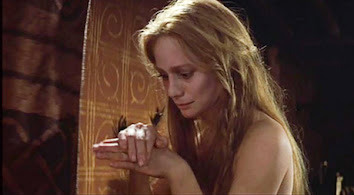“Methought I heard a voice cry ‘Sleep No More!’
Macbeth does murder sleep.”
-Act II, scene ii, lines 46-47
Here goes... In 1971, a new version of Macbeth was made, by director and sex criminal Roman Polanski. It happens to be the first film version of the play I ever saw, shown in a high school English class. And as much as we’d like to ignore Polanski, his significance in the film industry and that of some of his movies can’t be. For a time, this was the most popular version of Macbeth, it’s got a Criterion edition, and it has had an impact on Shakespearean movies that have come since and even medieval movies that have come since. More curiously, it happens to have the distinction of being the first movie Polanski made after the infamous death of his wife Sharon Tate at the hands of the Manson family. And his psyche in that context does inform the movie rather curiously.
It’s more violent than the versions of Macbeth that came before it, that’s for sure, and whether or not this is connected is pure speculation -though the film does go to a couple unnecessary lengths in its’ violence -even for one of Shakespeare’s bloodiest plays. It’s also tied heavily into conventions of realism, with efforts to translate an extremely accurate image of medieval Scotland (albeit one that appears aesthetically a few centuries ahead of the historic Macbeth). It’s impressive in some regards, and occasionally makes for a thrilling sequence or compelling set-piece, though I don’t think realism terribly suits Macbeth the way it would one of Shakespeare’s History plays for example. This is a narrative that features witches, ghosts, and a supernatural sense of predestination and fate -period authenticity doesn’t much matter. And in this case I don’t think it adds a lot making the world more gray and murky or casting the witches as decrepit, naked old hags in line with medieval attitudes. In some ways, the realism even inhibits the ability to be creative with the subject matter and the filming.
But Polanski does have some clear ideas, one of which is his choice of a young Macbeth. Jon Finch was just twenty-nine at filming, Francesca Annis merely twenty-six, and their ages went remarked upon by critics when the film came out (though Orson Welles was only a few years older at thirty-two when he did his version, he doesn’t radiate youth the way these actors do). It is notable to have a Macbeth at more the age of Hamlet, his ambition linked to an angry youthful recklessness. It casts the character in a different light, and Finch plays that well enough. He gives significant weight to the important speeches and with a degree of naturalness unexpected in an actor so young. It also appears his “thoughts are bloody” from the start, and that it doesn’t take much to provoke him to kill Duncan. Annis is underwhelming though as Lady Macbeth (her famous nude sleepwalking scene is too for how big a deal was made of it), and few of the rest of the cast really leave an impression, excepting Terence Bayler’s Macduff -though that might just be for his fantastic moustache.
I think the way the film plays the episode with Banquo’s Ghost is really good, possibly better than either version I’ve seen preceding it. And the killing of Duncan is rather striking too, strangely gory though it is. Other choices by Polanski don’t entirely work though -the floating dagger being a key one, both clashing with that otherwise commitment to realism and looking kind of silly. And again some of the violence, especially in the assault on the Macduffs, seems a touch overkill . There was no reason we needed to see armed soldiers raping a servant in the background of the carnage -but I guess that is to be expected from this director.
The film is grim, but it also seems indicative of Polanski’s mood -as Temple of the Doom was for Spielberg and Lucas. There’s no bombast to the final confrontation, it’s messy and pathetic to watch. And the film ends on a pessimistic note, where a returning Donalbain, Duncans’ second son, happens upon the witches, to presumably repeat the cycle. It’s a bleak ending to a bleak film -not one I terribly like. Sometimes an abundance of detail does nothing for Shakespeare, and perhaps what it instead needs is to be stripped back, returned to its’ roots.
Support me on Patreon: https://www.patreon.com/JordanBosch
Follow me on Twitter: https://twitter.com/Jordan_D_Bosch
Letterboxd: https://letterboxd.com/jbosch/


Comments
Post a Comment